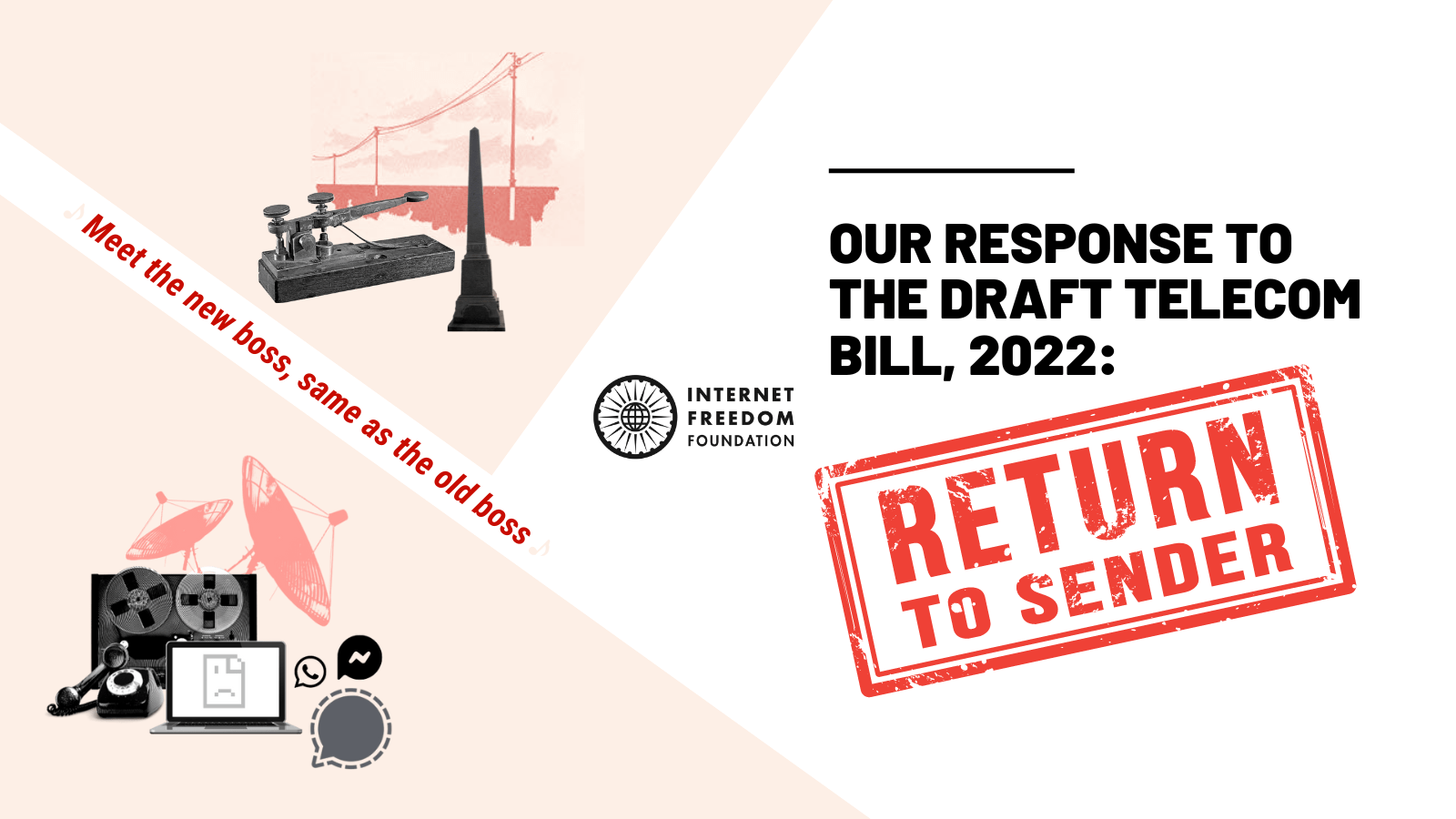
tl;dr
The draft Indian Telecommunication Bill, 2022 was released for public consultation on September 21, 2022. It follows the consultation paper on the “Need for a new legal framework governing Telecommunication in India” which was published on July 23, 2022. Read our brief, which forms a part of our consultation response, where we identify and analyse specific issues with the Telecom Bill, 2022. Our main recommendation is that the Telecom Bill, 2022 should be recalled and a fresh consultation process commensurate with the stated goal of “restructur(ing) the legal and regulatory framework for the telecommunications sector.”
Background
The draft Indian Telecommunication Bill, 2022 (“Telecom Bill, 2022”) was released for public consultation by the Department of Telecommunications (DoT) under the Ministry of Communications on September 21, 2022. It was accompanied by an explanatory note. Comments on the draft from relevant stakeholders have been invited till October 20, 2022 which was further extended to October 30, 2022. The comments can be sent to [email protected].
It consolidates the laws governing provision, development, expansion & operation of telecom services, telecom networks & telecom infrastructure and assignment of spectrum. In doing so, it repeals the Indian Telegraph Act, 1885, the Indian Wireless Telegraphy Act, 1933, & the Telegraph Wire (Unlawful Protection) Act,1950, while amending certain provisions of the Telecom Regulatory Authority of India Act (“TRAI”), 1997. However, any rules made under these legislations will continue to be in force. It purportedly takes into account the comments received from stakeholders & industry associations on the consultation paper on the “Need for a new legal framework governing Telecommunication in India” which was published on July 23, 2022 (Read IFF’s comments on the paper here). The deadline for submitting comments on the paper was August 25, 2022 which was further extended to September 1, 2022. The Telecom Bill was released three weeks after the completion of this deadline.
Key Concerns
Our public brief aims to provide an in-depth analysis of the content of the Telecom Bill, 2022. Before expanding on a detailed analysis, we list below seven main concerns with the Telecom Bill, 2022:
- Replication of colonial control: While the objectives of the Telecom Bill, 2022 are to create a modern and future-ready comprehensive framework for the telecommunication sector in India, it retains an antiquated approach. The preamble fails to include proper constitutional references such as the link between telecommunications and the right to freedom of speech and expression.
- Expansive definitions: The definitions clause brings a plethora of modern technologies under the purview of the Telecom Bill, 2022 which will now be required to obtain government issued licences for operating in India [Clause 2(21)]. Any and all telecommunication devices may be subject to licensing [Clause 3(2)]. Further, powers to issue standards are vague and may undermine end-to-end encryption [Clause 24(2)(a)].
- Greater state surveillance: There is replication of language from the Telegraph Act, 1885 [Section 5(2)] to the Telecom Bill, 2022 [Clause 24(2)(a)], maintaining surveillance powers without any meaningful oversight or accountability processes. This centralises power in the Union and State Executive and is contrary to Supreme Court judgements and advances in surveillance regulations in comparative, common law jurisdictions.
- Internet shutdowns power: The Telecom Bill, 2022 cements an internet suspension power with the DoT without putting in place any of the procedural safeguards directed by the Indian judiciary and Parliament [Clause 24(2)(b)].
- Ignoring net neutrality: With greater market concentration in the telecom sector and increased data flows the principles of net neutrality remain relevant for statutory recognition. Here, there is a need for DOT to act on TRAI recommendations for the creation of a multi-stakeholder body [TRAI’s recommendations on Traffic Management Practices (TMPs) and MultiStakeholder Body for Net Neutrality dated September 22, 2020].
- Onerous KYC processes: User’s right to anonymity and the fundamental right to privacy is weakened by allowing for identification of the sender of a message [Clause 4(7) and 4(8)]. This may lead to providing a legislative basis for the linking of Aadhaar to mobile phones which was ruled as unconstitutional by the Supreme Court of India. Further collection of personal information is being advanced in the absence of any data protection law, or surveillance reforms.
- Excessive penalties: Introduces penalties for users who use services provided by an unlicensed entity [Clause 47 read with Schedule 3]. It also makes the company officials personally liable for any offence that the company may be liable for under the Telecom Bill, 2022 [Clause 48].
Our main recommendation:
We urge the DoT to withdraw the Telecom Bill, 2022, publish a white paper with justifications and reasoning for introducing any changes, and set up an institutionalised system of broad, multi-city, in-person stakeholder consultation. We also urge the Union Government to appoint a Law Commission and/or an independent Standing Committee or expert body to look into reforms for the telecommunication sector.
Table summarising our issues and suggestions:
Important Documents:
- Draft Indian Telecommunication Bill, 2022 (link)
- Explanatory note on the draft Indian Telecommunication Bill, 2022 (link)
- Covering letter to our submission on the "draft Indian Telecommunication Bill, 2022" dated October 27, 2022 (link)
- Public Brief on draft Indian Telecommunication Bill, 2022 dated October 27, 2022 (link)
- Consultation paper on the “Need for a new legal framework governing Telecommunication in India” (link)
- Our submission on the “Need for a new legal framework governing Telecommunication in India” dated September 3, 2022 (link)



